Collectible Classic Muscle Cars You Can Afford

It’s mind-boggling. You sit there for hours, watching middle-aged guys in Hawaiian shirts and big watches bid stupid money on muscle cars on the myriad cable channels that broadcast collector-car auctions these days. Crappy models that were being swapped for a few hundred dollars a couple of decades ago are going for close to six figures now. And the good stuff is all over $100,000. The great stuff? That’s in the millions. So it’s safe to say that you probably can’t afford the classic muscle car of your dreams.
Here’s what we say: Change your dreams. Aim quirky, and expand your horizon beyond 1972. Here are a handful of solid, drivable, interesting cars that, more rather than less, qualify as muscle cars. More important, they’re cars you might be able to afford—you probably won’t even have to ask the kids to skip college.
1. 1970—1971 Ford Torino GT and Mercury Cyclone GT
AARON KILEY, DICK KELLEY, AL SATTERWHITE, HUMPHREY SUTTON, THE MANUFACTURER
Ford redesigned its mid-size cars for 1970, and America instantly fell out of love with them. Maybe it’s because Ford kept campaigning the long-nose 1969 Ford Torino Talladega and Mercury Cyclone Spoiler in NASCAR.
Built on the same mid-size chassis as those of previous Torinos and Cyclones, the 1970 and 1971 models are gracefully drawn with better interiors. Most 1970 Torino GTs and Cyclone GTs came with the 250-hp, 351-cubic-inch (5.8-liter) V-8. Torino GT Cobra and Cyclone GT Spoiler models were often powered by the Super Cobra Jet 429 (7.0-liter) V-8 rated at 360 horsepower.
2. 1973 Pontiac GTO and 1973—1975 Pontiac Grand Am

AARON KILEY, DICK KELLEY, AL SATTERWHITE, HUMPHREY SUTTON, THE MANUFACTURER
General Motors’s mid-size A-cars all got larger and heavier “colonnade” style bodies for 1973. But with the GTO nearly a spent force by then, Pontiac put little effort into it. Yet, it was the last traditional, mid-size GTO. Most of the 4806 built had a 230-hp 400-cubic-inch (6.6-liter) V-8; a 250-hp 455 (7.5-liter) was optional.
More interesting, and more popular, was the squishy-nosed Grand Am available as a coupe or sedan. Using the same body as the GTO, many were built with the 400 and the 250-horse 455.
3. 1971—1975 Ford Maverick Grabber
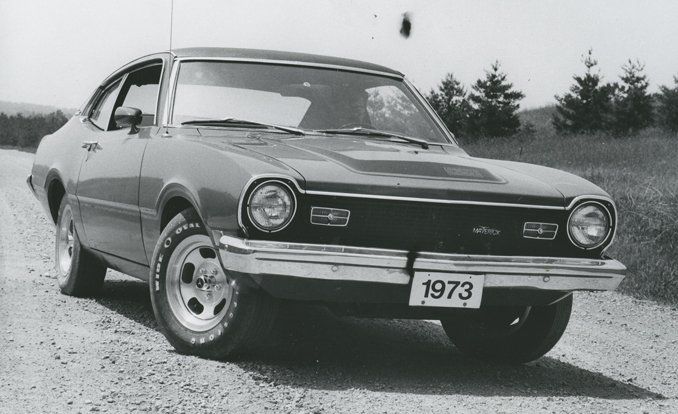
AARON KILEY, DICK KELLEY, AL SATTERWHITE, HUMPHREY SUTTON, THE MANUFACTURER
Not so much a muscle car as a car that looks like one, the Grabber was available with a 210-gross-horsepower 302-cubic-inch (4.9-liter) V-8. That dropped to 140 horsepower when Ford adopted net ratings in 1972 and 129 horsepower when emissions strangled output in 1975. Still, the Grabber was good-looking and simple to work on, and the Brazilians swear by their version.
4. 1974—1976 Dodge Dart Sport 360
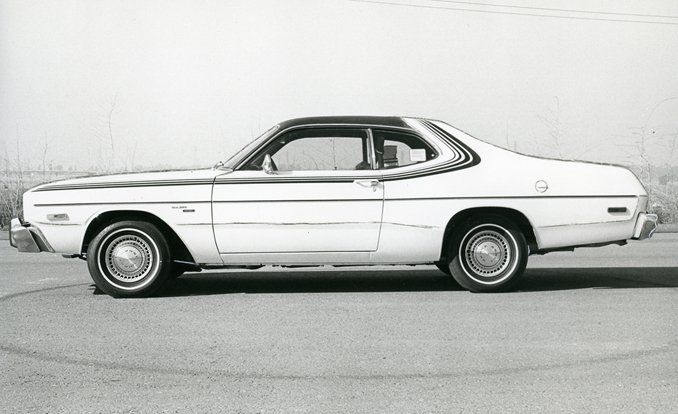
AARON KILEY, DICK KELLEY, AL SATTERWHITE, HUMPHREY SUTTON, THE MANUFACTURER
American performance was near its nadir in 1976. But amid those doldrums, Car and Driver organized a top-speed test of four cars and a truck. In second, behind the Corvette and ahead of the Trans Am, was the ordinary Dodge Dart Sport 360. “America’s fastest sedan is also one of its most innocuous; it blends into traffic like a lane divider,” Don Sherman concluded about the Dart.
With 200 net horsepower from a 360-cubic-inch (5.9-liter) V-8 under its hood and no catalyst clogging its dual exhaust system, the Dart freight-trained to 121.8 mph for C/D. Awesome for the time.
5. 1979 Pontiac Firebird Formula 400 WS6
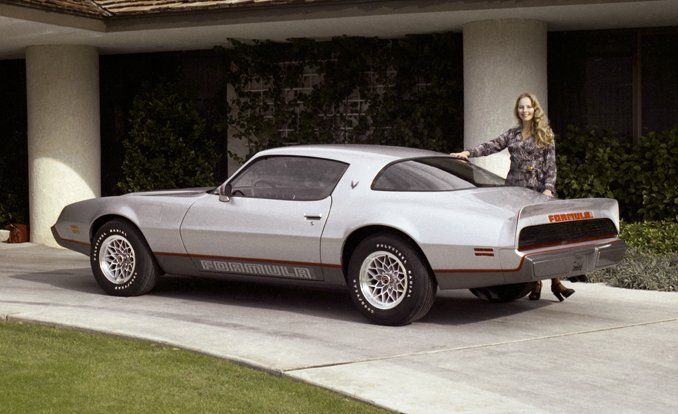
AARON KILEY, DICK KELLEY, AL SATTERWHITE, HUMPHREY SUTTON, THE MANUFACTURER
Late-1970s Trans Am prices have been inflated by a generation of Bandit wannabes, but the less flashy Formula is lagging. And it was only during the 1979 model year that the Formula was available with the 220-hp true Pontiac 400 (6.6-liter) V-8 and the WS6 handling package, which brought four-wheel disc brakes and the glorious “snowflake” alloy wheels along with it. There were only 24,851 Formulas made during 1979. How many of those had the 400 and WS6? Not many.
7. 1985—1990 Chevrolet Camaro IROC-Z and Pontiac Firebird Trans Am
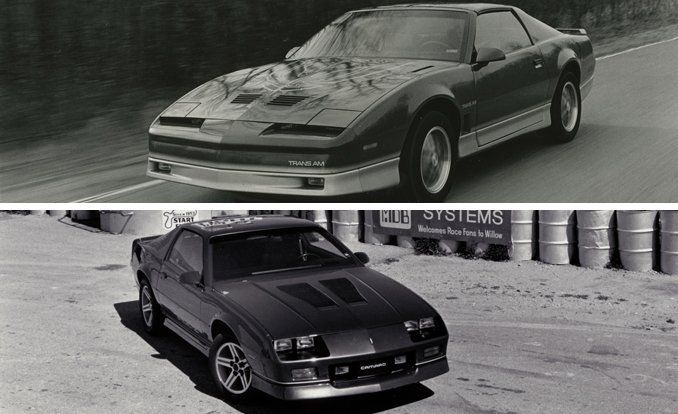
AARON KILEY, DICK KELLEY, AL SATTERWHITE, HUMPHREY SUTTON, THE MANUFACTURER
The third-generation F-body didn’t hit its stride until the 215-hp 5.0-liter V-8 and gorgeous IROC-Z arrived for 1985. The 225-hp 5.7-liter V-8 was phased in during 1986 and 1987. There are dozens of variations of the IROC and Trans Am available, and many are still cheap.
8. 1994—1996 Chevrolet Impala SS
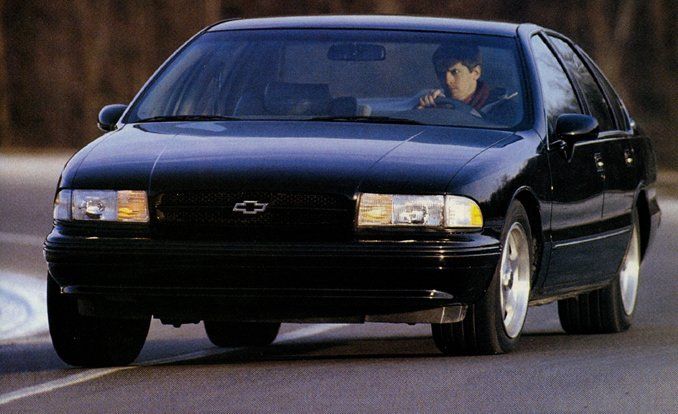
AARON KILEY, DICK KELLEY, AL SATTERWHITE, HUMPHREY SUTTON, THE MANUFACTURER
So big it can be used as a banquet hall, the mid-1990s Impala SS is essentially a redecorated Caprice 9C1 cop car powered by a 260-hp version of the Corvette’s old-school LT1 small-block V-8. Comfortable, surprisingly nimble, great-looking, and engineered like a girder bridge, the Impala SS is a bonafide muscle machine.
9. 1986–87 Dodge Omni GLH-S
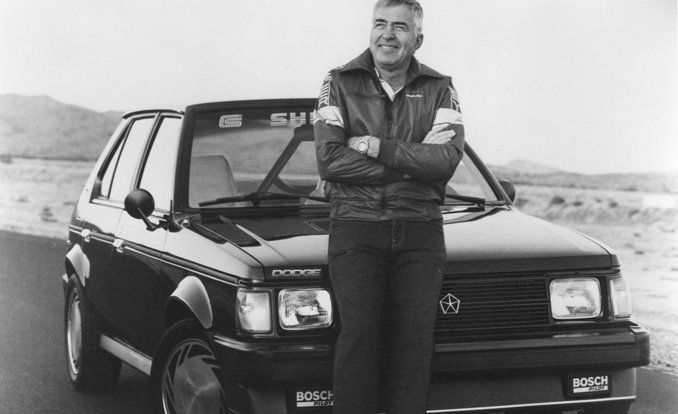
AARON KILEY, DICK KELLEY, AL SATTERWHITE, HUMPHREY SUTTON, THE MANUFACTURER
The Omni GLH-S has Shelby heritage, a reputation for ludicrous performance, and turbo lag that lasts a century. But it’s a front-wheel-drive five-door based on the chintzy and unloved Omni and powered by a turbocharged and intercooled 175-hp 2.2-liter four usually found in several undistinguished K-car variants. But buy it as a collectible, and you’ll love it for all its antisocial tendencies bred when Shelby tweaked the Omni GLH model. You already knew that GLH stood for “Goes Like Hell” and the S for “Some More.”
10. 1998—1999 Mercedes-Benz C43 AMG
We know, we know. Muscle cars are traditionally American-made machines. They’re also usually powered by V-8s and have rear-wheel drive—two things the Omni above lacks. Clearly, we’re being a bit loose with the term. Origins aside, the Mercedes-Benz C43 AMG meets the muscle car definition thanks to its rear-drive platform and 302-hp 4.3-liter V-8 engine. Plus, some were even built during the DaimlerChrysler era. So in a way, the C43 AMG fits the definition of a muscle car to a T.
play iconThe triangle icon that indicates to play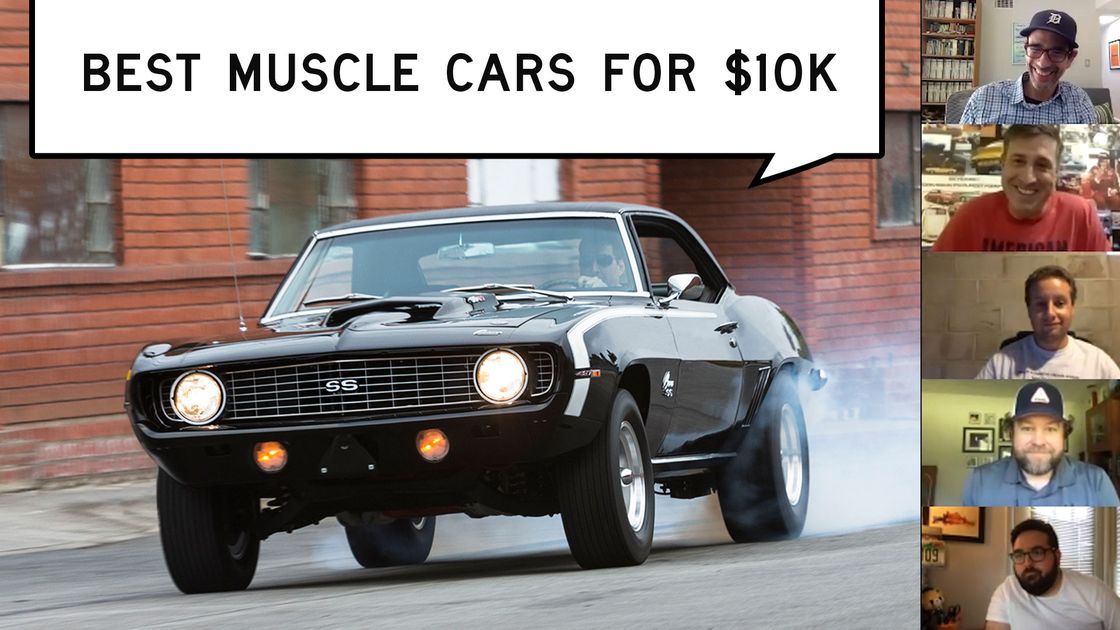 Car and driverCar and driver Lettermark logo
Car and driverCar and driver Lettermark logo
Senior Editor
John Pearley Huffman has been writing about cars since 1990 and is getting okay at it. Besides Car and Driver, his work has appeared in the New York Times and more than 100 automotive publications and websites. A graduate of UC Santa Barbara, he still lives near that campus with his wife and two children. He owns a pair of Toyota Tundras and two Siberian huskies. He used to have a Nova and a Camaro.



